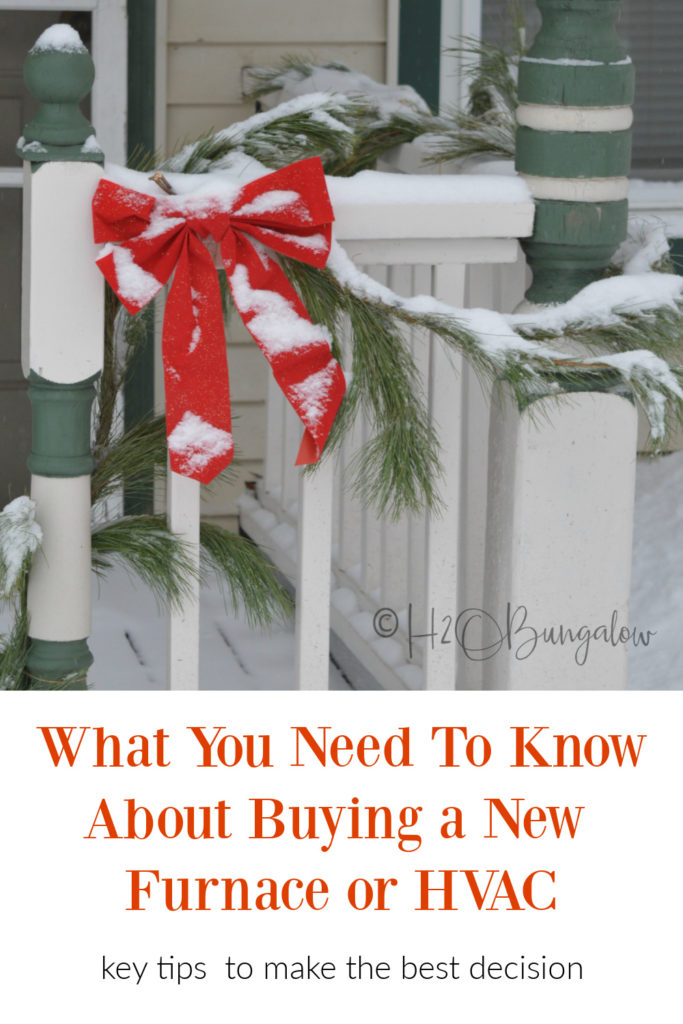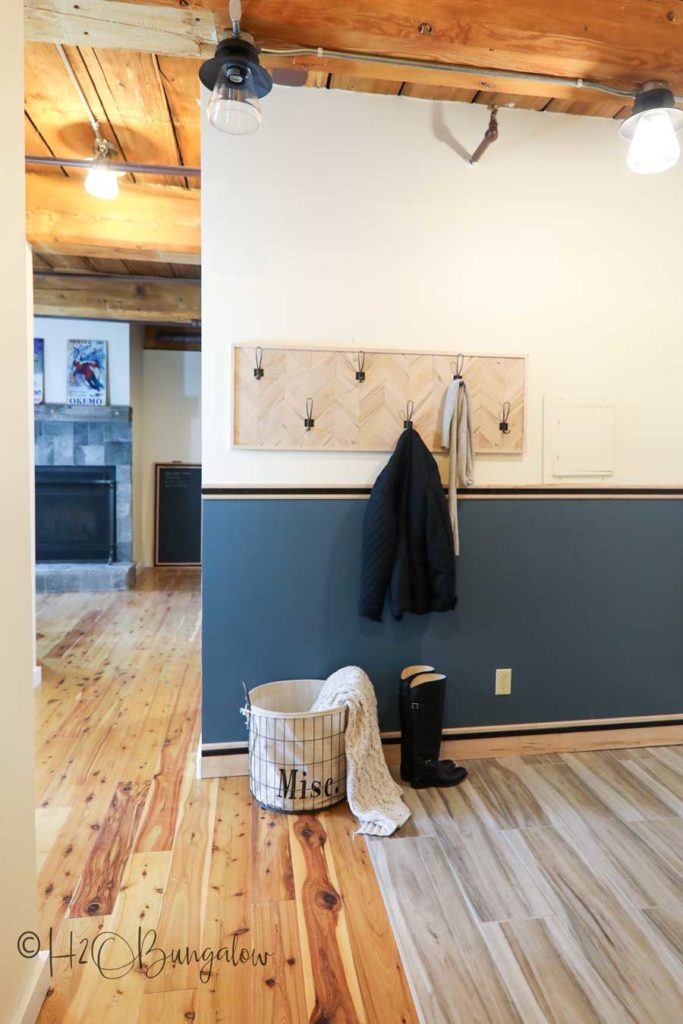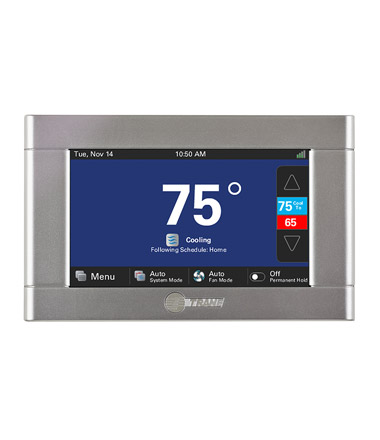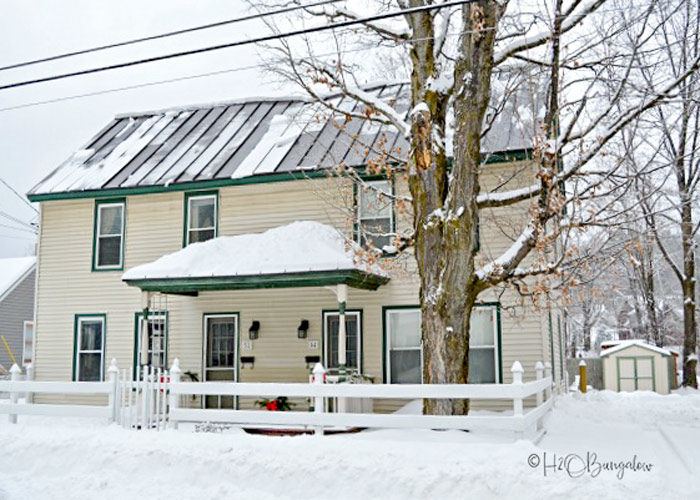This is a sponsored post written by me on behalf of Trane Residential. All opinions are 100% mine.
I’ve started researching what you need to know before buying a new heating system. Winter is approaching fast, and we had a few too many repairs last year to make me comfortable that we won’t keep having repair issues or worse.
Our repairman estimated our furnace to be about 20 years old. Given the average lifespan of a furnace is 15-20 years, I felt it was time to start researching my choices for heating our home!
For more posts on home maintenance check out 6 Tips To Extend The Life Of Your Heating and Cooling Systems, High-Tech Choices For HVAC, and How To Install a Tankless Water Heater

I believe in being proactive about home maintenance and upgrades. If I research now when I’m not in a hurry or pressed to make an on-the-spot decision, I know I’ll be able to make a better decision.
What you need to know before buying a new heating system
The first thing you want to know is whether you really need a new furnace or HVAC?
How do you know when to repair or replace and furnace or home HVAC system?
We already repaired our heater a few times last winter. It was freezing outside and by the time we paid for the emergency visit and the repair, the bills were hefty!
So, when do you know it’s time to replace a furnace or HVAC?
Trane has a useful rule. Take the cost of a repair and multiply it by the age of the system. If the cost is more than $5000, replace the system. If it’s less, repair it.
I wasn’t sure about when the right time of the year was to buy a new furnace or heating system. But, based on what I wrote a few weeks ago when I shared my 23 Things To Getting Your Home Ready For Winter and Cold Weather , the best time to buy is before needing to use the heat!

What type of heating system do I need? A furnace, heat pump or HVAC system?
Before you run out to buy a new heating system you need to know what you have.
How do I know what type of heating or cooling I need in my home? Not living in the northern parts of the country as an adult, I really had no idea about what I needed to know before buying a new furnace.
In Florida we turn our heat on maybe two or three times a year but run the air conditioning for a good part of the year. In Vermont, we run the heater for a good part of the year and don’t even have air conditioning.
The good thing is, if you don’t know what you need or what your limitations are or system requirements would be, a heating and air technician can help. I’m planning on calling a Trane Residential Comfort Specialist to review my home heating options. The link above will help you find one in your local area too.
They can tell me the best choices to make my home comfortable and what other options I have for convenience, being energy efficient and improving the quality of the air in our home.

What’s the difference between HVAC, heat pump, and a furnace?
What does HVAC mean? It’s an acronym for heating, ventilation and air conditioning. It includes all of the components that make your home more comfortable with heat and air cooling. This includes the ductwork, the thermostat and all mechanical parts of heating and cooling.
Within the HVAC, you have a system that can both heat and cool or perform just one of those functions. Since I only need to heat our home in Vermont, I’m looking at heating choices at this time.
A heat pump can provide cool air and heat. But air conditioners can only provide cool air. An air conditioner can also be installed with a furnace to provide both heat and cool air.
Heating functions alone in a home are carried out by a furnace. It can be powered by natural gas, propane or oil. Ours is powered by propane.
What to look for when buying a new HVAC or furnace.
There are a few important things to know when buying a new heating system.
Heating and cooling can account for nearly half of the energy used in your home. When seeking out a new system, it’s important to understand the efficiency of the heating and cooling system you are considering for your home. Newer models, especially those with ENERGY STAR certifications, are often more efficient. These systems tend to have higher AFUE, or annual fuel utilization efficiency ratings too.
A higher rating means the furnace has a higher fuel efficiency. Basically, the higher the number the more of the fuel used turns into heat.
What that means is if your furnace is at least 10 years old, it probably has an AFUE somewhere between 60 and 70 percent – meaning up to 40 cents of every dollar you pay for fuel is wasted.
To further maximize on your investment, I definitely recommend taking advantage of smart technology offerings. Using smart technology helps save on heating and AC costs by allowing you to program your system to run when it’s needed and cut back when it’s not. It can even control zones set within a home, which is great since we have parts of the house that aren’t used as much as the others.
Why pay for heating areas we don’t use?
I’m definitely checking into the Trane Comfort Link II smart thermostat. It allows all of the major systems in a home to communicate! It monitors and adjusts the temperature and humidity.

I already use and really like the Nexia Smart Bridge that the Trane Comfort Link II uses. I love how easy the interface is to use on the web or on the app on our phone! You can connect other things in your home like smart door locks.
Another important question: What size furnace do I need for my home? Be sure to shop for the correct size HVAC equipment. Too big and there’s wasted dollars, too small and it will be hard to make your home comfortable. A Trane Comfort Specialist can help with this through calculating your home’s specific needs.

Lastly, don’t forget the duct work in your home. Is it too small, old, or in need of repair? These are factors that will affect how well a furnace works. In older homes or homes that have had additions it’s not uncommon to need an upgrade in ducts or find the HVAC is not the right size anymore.
What else should I look at when shopping for a new HVAC system?
Since I’m shopping for a new furnace, I also want to know what else my HVAC system can do to help the quality of the air in my home.
One additional item that I’d definitely look in to is a whole home air cleaner, such as the Trane CleanEffects™. It removes up to 99.98% of airborne allergens from the air that passes through the filter – helping to rid the air we breathe from allergens like pet dander, dog hair, molds, fungus, and seasonal allergens .
There are no filters to replace and that’s huge!
There’s also the disposable Trane Comfort Performance Filter, that traps dust, pollen and bacteria. They’re compatible with Trane or any standard HVAC systems.
Always check to see if there are any rebates or tax credits available when you upgrade a furnace or HVAC system. Watch the expiration dates to be sure you qualify!
One more thing to consider when looking at new heating and air systems is how quiet will it be when running in my home? The last thing you want is a noisy furnace that you can hear turning on and off all night.
Pin my tips on what to know before buying a new heating system and share with your friends on Facebook!
Pin this now and share with your friends on Facebook!

Purchasing a new HVAC, furnace or air conditioner is a big investment.
Knowing what to look for when buying a new heating system for your home helps a homeowner make better choices.
At least for me, by spending a little time upfront and researching my choices I feel I’m prepared to make a good decision. One that will make the North House Lodge more comfortable, run efficiently to keep heating costs down and be dependable.
